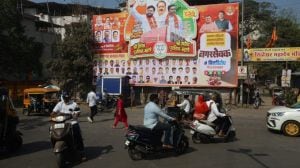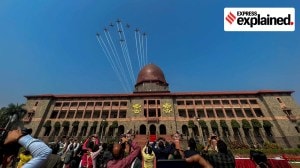Common Minimum President
Why is CPM keen on Pratibha? Because her career proves she can really use power

On May 10, 2007, a brief function was held in Parliament to commemorate the 150th anniversary of 1857, India8217;s First War of Independence, and President Kalam chose this occasion to advocate a two-party system for India. It is difficult for unignited minds to grasp the link between 1857 and a two-party system, but Kalam was clearly voicing one of those mesmerising ideas that apparently ignite the mythical Indian middle-class mind. We can now all see this great two-party idea at work as the country 8216;chooses8217; Kalam8217;s successor.
Ironically enough, Kalam8217;s name also came up as a candidate, but it was left to the 8216;third front8217; to root for him. However, none of Kalam8217;s coveted two parties showed any enthusiasm to gift him a second term and Kalam himself also fell for the 8216;principle of certainty8217; rather than savour the probabilities of a three-way contest. The race to Raisina Hill has thus narrowed down to a two-party spectacle, and Kalam can clearly retire on a note of satisfaction.
The BJP was, of course, the first to lay down its cards on the table by suggesting the name of Vice President B.S. Shekhawat for the top constitutional job. But strangely enough, it wants Shekhawat to be considered an independent candidate. Since when has BJP leaders started acquiring this 8216;independent8217; identity? Or more specifically, since when has the BJP started seeing greater political merit in parading its people as 8216;independent8217; entities? Is it another expression of the BJP8217;s identity crisis or a clever way to win cross-coalition 8216;conscience votes8217;?
The term 8216;conscience vote8217; has become a privileged euphemism in India8217;s parliamentary parlance. It is interesting that the act of defying one8217;s party decision should be glorified as an assertion of the person8217;s conscience. But how do we define the demarcation line between a 8216;conscience vote8217; and an ordinary act of floor-crossing which is presumed to reflect considerations quite distinct from the normal pangs of a healthy conscience? Maybe it is time to redefine the political economy of the conscience vote, in keeping with the norms of that mother of all institutions in a bourgeois world 8212; the all-pervasive market.
Be that as it may, the only party to have overtly responded to the call of the conscience so far is the Shiv Sena, the closest ideological cohort of the BJP. What an interesting political convergence! The CPM, we are told, is supporting the Congress candidate primarily for her impeccable secular credentials. And here we have the Shiv Sena readily supporting the same candidate, an impeccably secular Maharashtra politician! Would the Shiv Sena have done it so readily had the secular Congress not chosen to shelve the Srikrishna Commission report?
Meanwhile, the media is abuzz with reports on several other credentials of Pratibha Patil. We now know how she allegedly lent a helping hand to a brother who had been accused of getting his political contender physically eliminated. We also know that she may have got her cooperative bank to grant questionable loans and hefty waivers for her siblings and in-laws before the Reserve Bank of India stepped in and stopped the credit flow. We are also aware of her tremendous historical concern for women that informs her views on purdah and population control.
The media may love to enlighten us with more such disclosures, but these would only reinforce the other most important criterion that the CPM has been looking for. Pratibha Patil is clearly not a political novice when it comes to the art of managing power; she is by all means a tested and trusted Congress leader. And that is clearly sufficient basis for the UPA and its Left partners to elect her as the 8216;common minimum8217; president. And they do not forget to remind us that in doing this they are gifting India her first woman president.
Once the heat and dust of competitive politics settle down, and the combined numbers of the UPA, Left Front, BSP and 8216;NDA renegades8217; like the Shiv Sena usher Pratibha Patil into the Rashtrapati Bhavan, we will doubtless be reminded much more emphatically how immensely empowering the event has been for the Indian women. But will the empowerment enthusiasts ever tell us why the women8217;s reservation bill has been lying in Parliament8217;s cold storage for more than a decade? And will the CPM ever ask the Congress why it did not support Captain Lakshmi Sahgal in 2002 and instead chose to make common cause with the NDA when Gujarat was still crying for justice?
The 2007 presidential poll will also be remembered for at least two more names of possible candidates. The CPM went out of its way to plead the case of Pranab Mukherjee. Was the party hoping to humour post-Nandigram Bengal by sending out the message that it wanted Raisina Hill to have its first Bengali resident? Media reports also have it that the Congress could not get Shivraj Patil8217;s name cleared because of the CPM8217;s stubborn refusal. How come we have never heard about the CPM8217;s opposition to him as the Union home minister, an office that is presumably no less important than that of president?
While we await more disclosures from the probing media, let us watch with bated breath who makes it to Raisina Hill, Madam Tweedledum or Hon8217;ble Sri Tweedledee! Did someone say that democracy was about the possibility of making an informed and enlightened choice?
The writer is general secretary of the CPIML
- 01
- 02
- 03
- 04
- 05































